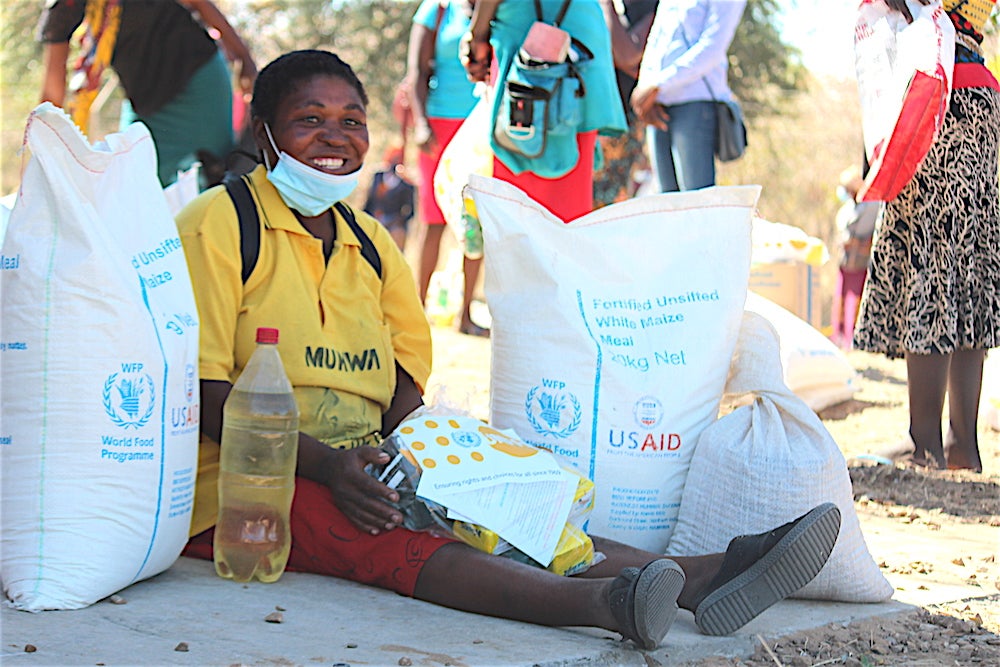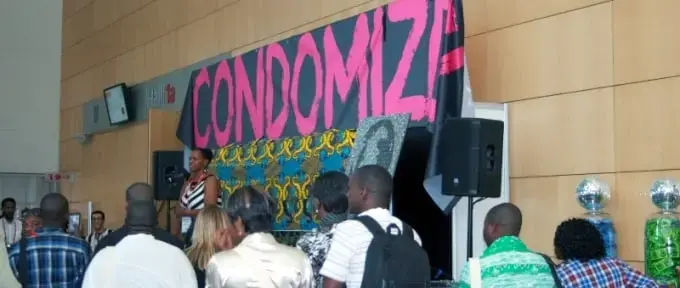OLUPANDU, Namibia—While the world is battling the COVID-19 pandemic, Secilia Jacob*, 18, is fighting her own battle with a different virus. She is learning to come to terms with her HIV status.
Ms. Jacob was born with the virus, a fact that she was unaware of despite being on antiretroviral treatment for most of her life. She has no memories of her parents, as they died while she was still an infant. No one had told her their cause of death.
Despite more than three decades having passed since Namibia's first HIV case was reported in 1986, children born with the virus are subjected to stigma and discrimination at the hands of their families, communities and at school.
Ms. Jacob, a pupil at a school in Namibia’s northern region of Omusati, received a parcel of food from the World Food Programme (WFP) as well as a dignity kit from UNFPA, the United Nations sexual and reproductive health agency, at Olupandu Clinic. The UNFPA and WFP collaboration complemented the government’s efforts in responding to the drought, after President Hage Geingob declared a state of emergency last year.
It was during this process that she told her story to UNFPA.
I always had to take medication, but I never knew what for.
Discovery of HIV status

“I always had to take medication, but I never knew what for,” she said. “My grandmother told me not to let anyone touch my blood and stuff, but I had no idea what she was talking about. And she kept taking me to the hospital every month.”
One day, during the school holidays in August 2017, her brother broke the news to her. It was a devastating moment.
“He called me to the room and asked if I knew why I [took the] medicine. He explained that it was because I was born HIV-positive. I knew what HIV was, so I couldn’t digest the thought of me having it and why I was only finding out now,” she said.
“I started to cry and he gave me a hug and reassured me that everything would be okay. I do not blame my parents, grandmother or brother. I just wish they had told me earlier,” she said.
According to the recent Namibia Population-Based HIV Impact Assessment (NAMPHIA) 2018 report, HIV prevalence was 13 per cent among adults aged 15 and 64 years, and 86 per cent of people living with HIV were aware of their HIV status. Ongoing access to antiretroviral therapy (ART) is critical to their health and wellbeing.
In collaboration with the Society for Family Health and the Namibia Planned Parenthood Association, UNFPA conducted mobile outreach in informal settlements and rural areas, serving thousands of young people in need by providing HIV counselling and testing, antiretroviral therapy and pre-exposure prophylaxis. Young people also received sexual and reproductive health services and information, gender-based violence services and referral for further services.
Supporting health services during state of emergency
For many orphaned girls like Ms. Jacob, the COVID-19 pandemic has also exacerbated difficulties accessing menstrual hygiene products, as well as supportive programmes through schools and charity-based initiatives, due to movement restrictions.
I used to get sanitary pads from my school. Now I have to ask family members to buy them for me, which is very uncomfortable.
“I used to get sanitary pads from my school. Now that schools are closed, I have to ask family members to buy them for me, which is very uncomfortable,” she said. “If we go on a lockdown again, we will really find it hard to cope with [our] periods.”
UNFPA distributed about 6,000 dignity kits to women and adolescent girls who cannot afford menstrual pads in Kavango West, Ohangwena, Omusati, Kunene, Omaheke and Zambezi regions. The kits contain washing powder, sanitary pads, bathing soap and other toiletries.
UNFPA has also partnered with civil society organizations to ensure the continuity of sexual and reproductive health and gender-based violence services during the lockdown.
* Name changed to protect her privacy.




